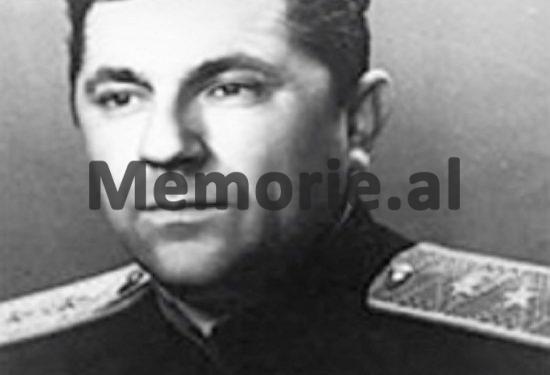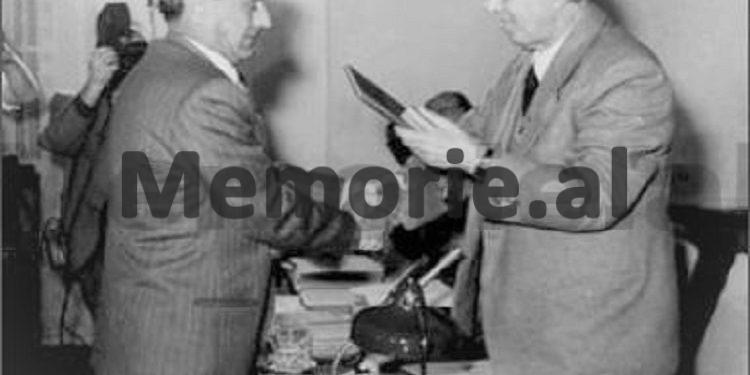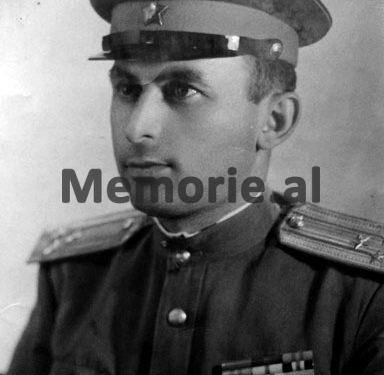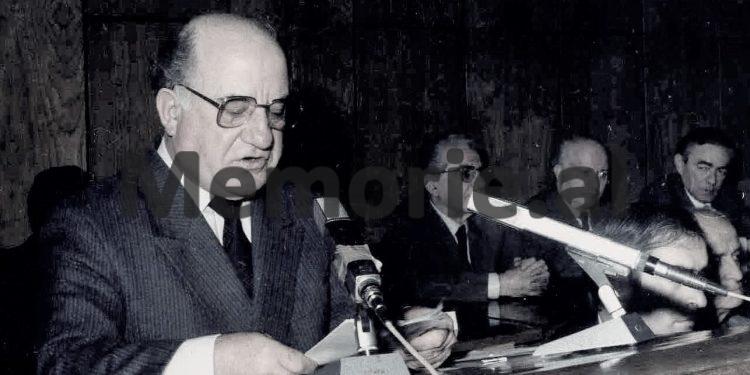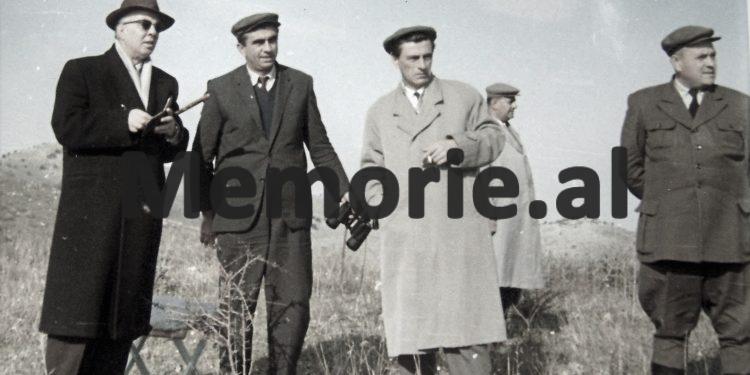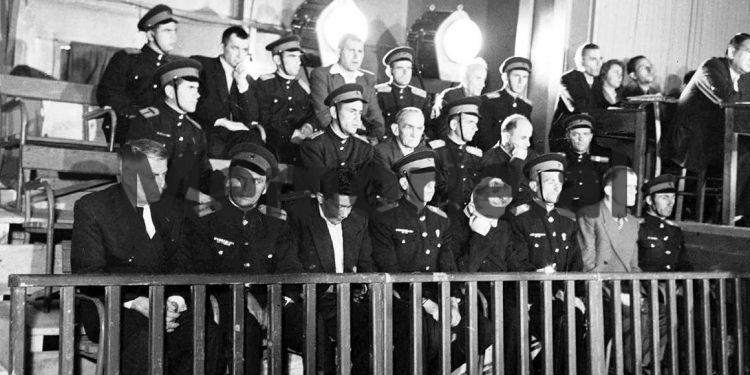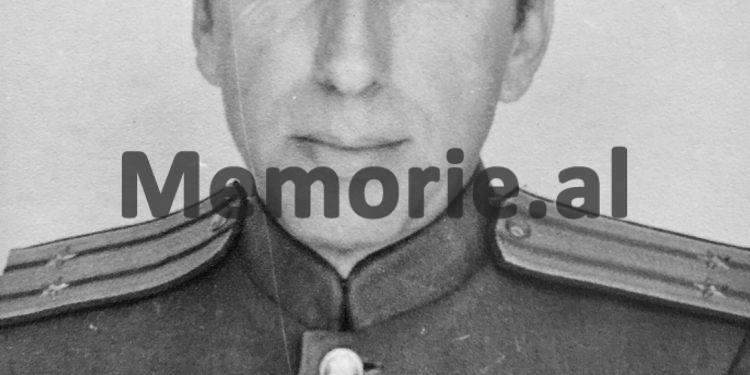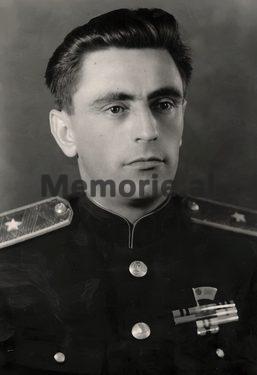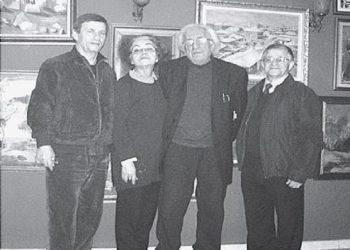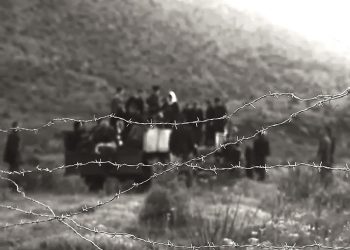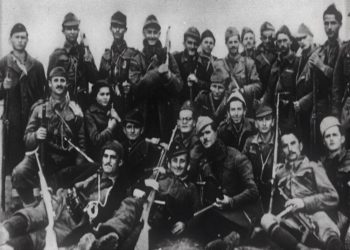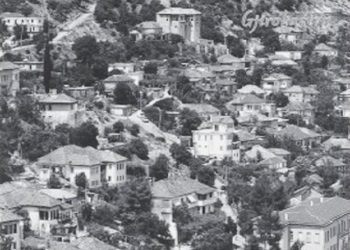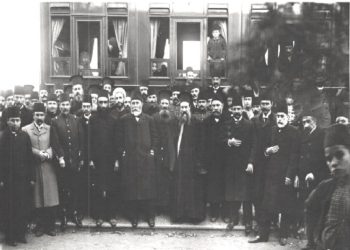Dashnor Kaloçi
Part seven
Memorie.al publishes some documents issued by the Central State Archive (fund of the former Central Committee of the ALP), where there is a voluminous file with archival materials which bear the logo ‘Top secret’, which belong to the period of years 1981-1982, with reports, reports, evidence, information, minutes of the meetings of the Politburo and the secretariat of the Central Committee of the ALP, etc., starting from what was held to review and analyze the self-criticism of the former Prime Minister Mehmet Shehu in December 1981, for allowing the engagement of his son, Skënder, “with a girl who had some political fugitives in her family circle”, the marathon meeting of the Politburo on the afternoon of December 17 his year that continued until the late hours of that night, where that problem was discussed with the debates and discussions of all members who “crucified” former Prime Minister Shehu, the meeting of the morning of December 18, after the news that Prime Minister Mehme t Shehu had killed himself, the marathon meeting of the Secretariat of the Central Committee of the ALP on September 20, 1982, with the topic: “Analysis of serious mistakes of Kadri Hazbiu, committed during the period when he was deputy minister and minister of Internal Affairs “, where Enver Hoxha initially launched accusations against Kadri Hazbiu, luring him as a” loyalist of the Party “, (in order for him to” open the heart of the Party “, speaking against former Prime Minister Mehmet Shehu) , where at the beginning of his speech, Enver said: “After the coup in the army, we discovered the traitorous group in economics of Abdyl Këllez, Koço Theodhos and Kiço Ngjela with friends. We also discovered this group here; it was not discovered by the State Security. The same can be said about the discovery of the group of Fadil Paçrami, Todi Lubonja and a number of other people connected with them, such as Ismail Kadareja with friends, the Security did not reveal, but that hostile work was discovered by the Committee Central ”, etc.! All these and other documents with the logo ‘Top secret’, will be published in several issues in a row, exclusively by Memorie.al
Continued from the previous issue
COMRADE KADRI HAZBIU: No, no, I am saying this, Comrade Enver, it does not matter who is or is not a director in the Ministry of Defense Sh. M., and here I have the issue to myself. I myself had to take these people one by one, to see what to do with one and what to do with the other, and I have not dealt with this work.
After learning these, as far as I know, we have given the lists to the Central Committee, these have been studied here and we have been instructed on how these people should be treated. They may have been summoned by the Party and some of them were summoned by leading cadres of the Ministry of Internal Affairs, where they were told not to worry about these problems, that they had carried out the orders given to them, did not bear any responsibility.
COMRADE ENVER HOXHA: Did Mehmet Shehu know these issues?
COMRADE KADRI HAZBIU: I could not say that I gave a list to Mehmet Shehu myself. He is a traitor, but he did not ask me to do so. The lists I have given here, at the Central Committee, friends have seen them and given me the messages I said. I know it was a more complete list of some 180 or 200 names, exactly how many there were, I do not know.
COMRADE ENVER HOXHA: Look, Kadri, these are two facts that we are raising you here today. You yourself should know and you other friends should know, that in the Ministry of Internal Affairs there is a whole life, there should be other documents that we have a duty to have patience and composure until we find them and see them. But for now we have these two facts.
In the letter you write to comrade Hysni and inform him that you have destroyed the documents of these people.
COMRADE KADRI HAZBIU: As a collaborator.
COMRADE ENVER HOXHA: I do not know what these were, I want to ask you: why did you burn their documents?
COMRADE KADRI HAZBIU: It is a rule for us, Comrade Enver, I do not know if we should look at it, but from what we saw, they were no longer valid as collaborators, they should have the card in the file, and their file should be burned as worthless collaborators. We had these rules, so we acted like the rules. If anything has been done against them, then it is different.
COMRADE ENVER HOXHA: Yes, yes, this is how we sang these materials, so that you can tell us that you have destroyed them. Namely all the documents of these collaborators, you destroyed.
COMRADE KADRI HAZBIU: Yes, yes, we destroyed them.
COMRADE ENVER HOXHA: You annihilated them and they were no longer kept in touch by you? Is that so?
COMRADE KADRI HAZBIU: No, they were not held.
COMRADE ENVER HOXHA: What did these documents contain?
COMRADE KADRI HAZBIU: Those were their personal documents, as I say, Comrade Enver, they had not the biography, not the nickname as a collaborator, not other requirements that we needed for them. For all these people there should be cards, why, if the document is burned, the card with which it is confirmed that this or that person was a collaborator at this time it remains to know who kept him in touch, etc. The card has all this data needed.
COMRADE ENVER HOXHA: Yes, yes, well, pop that they burn? These were officials of our state.
COMRADE KADRI HAZBIU: What about the reasons why the collaborators of the State Security were no more, Comrade Enver.
COMRADE ENVER HOXHA: These were charged by the Ministry of Internal Affairs as collaborators in the Soviet Union, they are honest people, then why burn their documents?
COMRADE KADRI HAZBIU: They must have been burned later, Comrade Enver, when all of them returned from the Soviet Union.
COMRADE ENVER HOXHA: Yes, I am based on what you yourself said, that you burned the documents of these people in 1975. You may have burned them before, I do not know that, but we burned them.
COMRADE KADRI HAZBIU: No, I do not know him. Let this matter be verified, Comrade Enver.
COMRADE RAMIZ ALIA: Was there anything other than their personal file? Was there anything in these files and written reports that they made about each other?
COMRADE ENVER HOXHA: Did they make reports or not?
COMRADE KADRI HAZBIU: They did not make reports here, Comrade Enver, they also made reports to those in the Soviet Union.
COMRADE ENVER HOXHA: That is, we had put these people completely in the service of the Soviets.
COMRADE KADRI HAZBIU: They were put in the same way, Comrade Enver.
COMRADE ENVER HOXHA: How was that? How was it possible to do so? This is not allowed. Let’s assume we’re sending a residency, an agency, to connect with the Soviets. Why did we do that? To preserve, as you say, the purity of our people and to watch the actions of our cadres?
This means that they had to report to us, that they had to work for us, despite the fact that for a moment we admit that they also gave reports to the Soviets, but these reports had to be made to us. Are these reports or are they not?
COMRADE KADRI HAZBIU: As a rule, they are reports and are called work files. These are stored for a while, Comrade Enver, then as a rule, are destroyed. So it is with everyone else. How much they have kept and how they have kept these, I am not able to say anything right now.
COMRADE ENVER HOXHA: But here is the issue of your responsibility, Kadri that being surrounded by all these enemy elements, means that you slept there among them.
COMRADE KADRI HAZBIU: For me, let any measure be taken for what has been done, Comrade Enver.
COMRADE ENVER HOXHA: The measure, Kadri, will be taken and will be tried calmly by the Politburo; we do not discuss here the measure that can be taken on this issue.
COMRADE RAMIZ ALIA: We have not put you in front of responsibility here.
COMRADE KADRI HAZBIU: One minute, one minute, I had the floor here, Comrade Ramiz, when I say let any measure be taken, I say this for those issues that have saved me, that is all I have to say.
COMRADE RAMIZ ALIA: Did things save you?
COMRADE KADRI HAZBIU: Look, during the time we have been in relations with the Russians, to be honest, I do not remember exactly, that when we had in hand the combination of Teme Sejko, comrade Enver called me here and ordered me to close tap the Thracian Russians. I remember this message well and since then we have not given them anything.
COMRADE ENVER HOXHA: I do not remember what you say.
COMRADE KADRI HAZBIU: I remember, Comrade Enver, and I remember that well.
COMRADE ENVER HOXHA: Yes, you can keep it.
COMRADE KADRI HAZBIU: Because, when we had in our hands the whole combination of Teme Sejko, the Russians came and were interested in this issue.
SHOUK HEKURAN ISAI: What year did Sejko come out?
COMRADE KADRI HAZBIU: From 1959 to 1960. This is what Comrade Enver told me, to say absolutely nothing to the Russians about this.
COMRADE ENVER HOXHA: Yes, you can for Teme Sejko, because they suspected that Teme Sejko must have been a complicated game, and you did not link this to Teme Sejko. I also do not understand the issue that he organized in the port, but for whom, for what foreign powers did he do it?
COMRADE KADRI HAZBIU: As it turned out to us then, he was playing that game on behalf of the Americans.
COMRADE ENVER HOXHA: Yes, yes, what else?
COMRADE KADRI HAZBIU: Other than the Russians, what about them, the issue remained questionable?
COMRADE ENVER HOXHA: How did you end up with the question mark?
COMRADE KADRI HAZBIU: We were left with the question of the leadership of the Russians and this issue was related to Panajot Plaku, as far as I remember. Panajot Plaku, as I remember, came to Vlora illegally then and word spread that he had met there with a Russian admiral. This information was provided by Teme Sejko in the process.
Until then, Temen was our agent for the Americans. When it turned out that he had gotten in touch with Panajot Plaku, who as far as I remember, was also an agent of the British, but rather of the Russians, then the question arose that Teme Sejko should be an agent of both the Americans and the Russians, yes his whole process, has developed mainly in the direction of the Americans.
COMRADE ENVER HOXHA: At the congress we could not say unverified things, we only said that the plot of Teme Sejko, organized by the 6th American Fleet, by the Greeks and by the Soviet Union, was revealed. Who was running this now?
COMRADE KADRI HAZBIU: Who?
COMRADE ENVER HOXHA: This plot down there?
COMRADE KADRI HAZBIU: It turned out that Teme Sejko was in charge.
COMRADE ENVER HOXHA: But who directed Teme Sejko here?
COMRADE KADRI HAZBIU: The Americans ran it.
COMRADE ENVER HOXHA: Americans, through whom?
COMRADE KADRI HAZBIU: Exactly now I do not remember, Comrade Enver, with whom he had relations, but referring to his file, the center of the Americans was in Athens.
COMRADE ENVER HOXHA: Was the American center in Cairo, or was it in Athens?
COMRADE KADRI HAZBIU: Through Haki Rushiti.
COMRADE ENVER HOXHA: Do we know those things, but why not direct them through Mehmet Shehu, who we had here?
COMRADE KADRI HAZBIU: That did not happen to us at that time, Comrade Enver.
COMRADE ENVER HOXHA: If it did not come out to us, if it had not come out to us, we would have cut off his head at that time, we are talking about now.
COMRADE KADRI HAZBIU: I know one thing that for Teme Sejko I asked for authorization then, even before the execution, to torture him. For this purpose, Mihallaq Ziçishti and Xhep Kolli took him and put pressure on him. However, Temja said nothing to him. In these circumstances, Comrade Enver, what can I say now, wherever I want to go…
HEKURAN ISAI COMRADE: Teme Sejkon, they did not kill him based on the decision, they were killing him.
COMRADE KADRI HAZBIU: It’s the same, it does not matter. He was not strangled; he was executed in the appointed place.
COMRADE HEKURAN ISAI: They did not execute him, they killed him, they killed him, Comrade Enver.
COMRADE KADRI HAZBIU: Yes, he could, maybe they even killed him, but we had orders to put pressure on him even in the time before the execution.
COMRADE ENVER HOXHA: But why did you kill him? Take him to court!
HEKURAN ISAI COMRADE: No, based on the court decision he was sentenced to be shot.
COMRADE KADRI HAZBIU: After the trial and before he was executed, I then asked for authorization to put more pressure on Teme Sejko, to see what else could bring us out, and I entrusted this to these two, Xhep Kolli and Mihallaq Ziçishtit.
Both of them took Teme Sejko to the place of execution, pressured him or not, I do not know, but finally killed him. He did not say anything more in this regard than what he had said in the trial.
COMRADE ENVER HOXHA: Both Beqir Balluku and Petrit Dumja also acted, all of them accepted only what we said in the Central Committee and nothing more.
COMRADE KADRI HAZBIU: YES, they may have said something very small.
COMRADE ENVER HOXHA: Yes, small things and nothing else. So what conclusions do you draw from all this work of the Security organs you lead, Kadri?
COMRADE KADRI HAZBIU: I have drawn this conclusion that the work done by the State Security could not deepen further issues, and my opinion was, if so, that Feçor Shehu, I am talking about the coup plotters, was a traitor , otherwise he talks to me here, otherwise he acted on the other side. I told you this. At your request, I called Beqir Balluku myself and asked him directly: are you or are you not an agent of the Yugoslavs?
He sat for a few minutes as silent, Comrade Enver, stood and just looked me in the eye, but said nothing to me. Even later I thought that Mehmet Shehu, how did he not call me once to ask me: did you, Comrade Kadri, as Minister of Internal Affairs, not tell us a bit, what is being done with this process? He is not interested at all. You called me, comrade Hysni too, and I reported to you, but he did not say a word to me, so in these circumstances, I thought that maybe he was taking the data from you, I remembered that you were saying something to him. Memorie.al
Continues in the next issue




